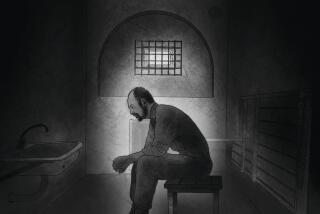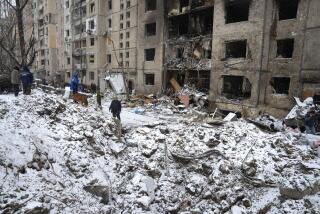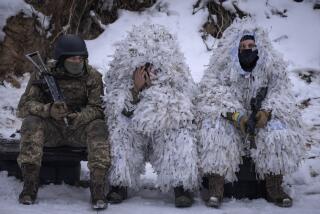Ordeal in Cold Leaves Recruit Dead, Russians Angry
- Share via
CHERNOGOLOVKA, Russia — When he saw his son off to join the army in December, Mikhail Sorokin figured the boy was dressed appropriately for the relatively mild snowy weather in Moscow: jeans, track shoes, a light jacket.
He never knew the young soldiers would be put on a plane for frigid Siberia.
The new recruits were “cold like dogs,” one wrote his mother, after being forced to stand for hours without protective clothing on an airport tarmac in temperatures as low as 25 degrees below zero.
By the time their two-day odyssey was over, at least 80 were hospitalized with acute respiratory illnesses, including severe pneumonia. One died, and at least 40 -- six weeks after the incident -- remain hospitalized in the remote Siberian town of Magadan. Several more are undergoing medical treatment on the Kamchatka Peninsula.
The fate of 18-year-old Semyon Sorokin and 193 other army conscripts has horrified Moscow. President Vladimir V. Putin has demanded an investigation and punishment.
“This is why parents try to help their sons avoid the military service,” Mikhail Sorokin, 44, an equipment manufacturer in this small Moscow suburb, said Thursday. “He’s still in the hospital. I talked to him on the phone, and he told me, ‘I got pneumonia because I got too cold.’
“For myself, I hope that the people who are responsible for allowing something like this to happen will have quite a lot of time to think about it when they go to prison.”
The case has focused renewed attention on the Russian military, which despite years of reforms and modernization is beset with widespread cases of malnutrition, substandard medical treatment and beatings among the 400,000 recruits drafted each year.
An estimated 2,000 to 3,000 Russian soldiers die each year of noncombat causes, 20% of them from suicide.
“The basic postulate from the Soviet era until now says a conscript is a nobody. He’s a cogwheel in a machine, and this cogwheel is a very inexpensive element of that machine which, if it breaks down, can be replaced very easily,” said Veronika Marchenko of the Mother’s Right Fund, an advocacy group for military families.
“That’s why nobody bothered to think about whether these guys were cold or not,” Marchenko said. “Because it simply didn’t matter.”
Military prosecutors opened criminal proceedings this week against three high-ranking officers: the commander of the Siberian Military District, the assistant to the chief of the district’s transportation service, and the head of the Magadan border unit. No charges have been filed. More than 250 officials, including several generals, already have been questioned.
“This case must be thoroughly investigated, and the guilty should be punished,” Putin said after the incident came to light. “How can we talk about the possibility of reinforcing personnel if we are going to encounter these kinds of cases in the future?”
Soldiers told reporters that they had been drafted as federal border guards and left Moscow on Dec. 3. They spent the night of Dec. 4 on the bare, cold floor of a military airport, then were flown to Siberia and the Russian Far East.
During two refueling stops, the soldiers were forced to stand outside for hours on end in temperatures that ranged from minus 4 to minus 25 degrees, not counting the windchill factor.
They were issued warm clothing in Kamchatka, but many of them already were sick. Still, they spent nine days in a frosty barracks before being flown to Magadan in Siberia, the site of many of the 1930s Soviet gulags.
By that time, witnesses said, Vladimir Berezin, an 18-year-old recruit from Moscow, was already suffering “suffocation fits.”
Doctors in Magadan said he had been very ill for three weeks before being brought to the hospital for medical treatment and appeared to have been underfed. He died of a thrombosis brought on by pneumonia four days after being admitted to intensive care.
Other soldiers were admitted with pneumonia, sinus infections and other acute respiratory symptoms.
“What I would like most of all now is to see those people who are responsible for the death of my son to be exposed to the same suffering, misery and humiliation he had to go through in the last days of his life,” said Berezin’s mother, Tatyana.
A letter from recruit Alexander Kostyuk was mailed to his mother shortly after the group arrived in Kamchatka.
“At first the plane was delayed, and we spent the night sleeping on the floor in a barracks near the airport,” he wrote. “Then the plane broke down during the flight and we got stuck in Novosibirsk for a while. There the frost was [minus 4 degrees]. We got cold like dogs. They are feeding us badly here. OK, I can’t write any more. The sergeant is screaming.”
Since getting the letter, said Tatyana Kostyuk, an engineer at a Moscow eye hospital, she has been unable to get any information about her son’s whereabouts or condition. Military officials, she said, “told me that they registered my [query] and are processing it in due order.”
“ ‘Where is my son?’ I asked him. He said: ‘I can’t tell you. We have no lists here.’ So I don’t know where my son is. I don’t know whether he is in the hospital or not. I haven’t heard from him for over a month. And they have the gall to tell me they don’t know where he is. What is this all about? Are we at war?”
At Magadan Hospital, Dr. Lyubov Sayevich said she treated 17 recruits who had gone without adequate medical care for two weeks before being brought to the civilian hospital in late December. Most, she said, should have been immediately hospitalized weeks earlier.
“I have no words to express my indignation at this whole affair,” she said. “There was plenty of time after their arrival in Magadan to render proper medical help to them, but this was not done. It is outrageous. It is a crime.”
Semyon Sorokin’s mother, Vera, has cobbled together $689 for an airline ticket and is flying to Magadan today to learn his condition.
“It’s very hard to get the truth. I need to be there. I don’t trust anyone until I see his medical chart, until I actually see him,” she said.
“We’re not trying to protect our son from serving in the military. We didn’t hide him, he was eager to go and serve his country, and the people who treated him like this are criminals.”
Times staff writer Sergei L. Loiko contributed to this report.
More to Read
Sign up for Essential California
The most important California stories and recommendations in your inbox every morning.
You may occasionally receive promotional content from the Los Angeles Times.










